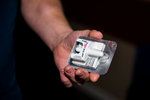
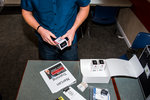

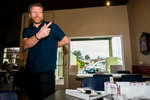

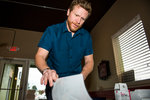
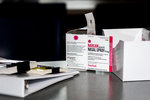
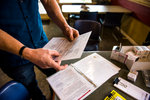
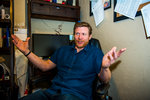
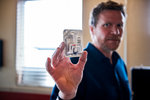
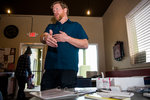

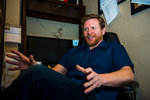
Since it started carrying the opioid overdose-reversing drug Narcan nearly five months ago, Gather Church has handed out more than 60 boxes of the stuff, each containing two nasal doses.
That was just through word of mouth, said the church’s pastor Cole Meckle. Now that word is getting out that Narcan is on hand, he expects that number to go up.
To Meckle, that number, perhaps surprisingly high for some, represents two prongs of the same thought: That represents a lot of people in the community suffering from opioid addiction, but it’s also a lot of lives on the brink that may be saved.
“From my perspective, let’s save people over and over and over and over again until the day comes that they are ready and willing to seek treatment,” he said.
Meckle’s not oblivious to the fact that others might see this part of the church’s ministry in a negative light. Narcan, known also by its drug name, naloxone, and its accessibility haven’t exactly proven to be a controversy-free topic, with the word “enabling” a frequent flyer in counter arguments.
“A lot of folks want to talk about how something like naloxone will enable people, and I don’t see that in any way. I can get how people could think that, but that’s not the mindset of an addict. … The possibility of dying isn’t a deterrent for someone who’s an opioid addict,” said Meckle.
Rather, he said, regarding people he’s encountered — both in local outreach and while working in downtown Seattle and Vancouver, Canada — a person suffering from addiction fears the repercussions of not finding the next fix more than a fatal overdose.
Meckle’s conversation with The Chronicle came shortly after a time when the Lewis County Department of Public Health and Social Services reported an uptick in officer-administered doses of Narcan. By the first week of November, Lewis County law enforcement had given a dozen doses since they started carrying it in August 2017; seven of those administrations were within a recent six-week time span.
“It’s kind of impossible to pinpoint it at the local level with a definitive answer, but from what the state and the region has seen, normally these spikes are due to a batch of drugs having fentanyl in them potentially, and … with fentanyl being mixed in with other drugs that don’t have opioids in them, such as cocaine or meth,” said Community Health and Contracts Coordinator Katie Strozyk.
At Gather Church, Meckle said people keen on getting some Narcan must fill out a form. It’s anonymous, but some sort of identification — like a code name involving some variation of initials — is recorded for tracking purposes. Meckle said he wants to remove any barrier between the drug and someone who needs it.
That’s not to say the only people who have stopped by for a dose of Narcan suffer from addiction themselves. Concerned loved ones come in, too. Some get doses and give them to friends. This information is tracked with forms they must fill out, containing some basic information on why they need Narcan.
They get a 10-minute training session that covers how to identify an opioid overdose (there is no adverse effect if someone not overdosing on opioids receives a dose of Narcan) and how to administer the nasal spray.
The supply is made possible by a grant from the University of Washington, said Meckle. Before they started distributing, however, Meckle said the idea was posed to him while attending a meeting with the Lewis County Opioid Task Force. The church and its board had already been talking about doing something, which is why Meckle suspects they were approached in the first place.
The Lewis County Opioid Taskforce is a group made of a cross-section of entities, including law enforcement and health officials. Faith-based organizations are involved, too. Meckle explained that a church’s relationship with the community is very specific, and as such can encourage people to seek treatment in ways other entities can’t.
And as such, conversation with people showing up for Narcan delves a little deeper than just signing some forms and handing over a box.
Most of the people they’ve supplied so far are individuals with established relationships with the church already — either through Gather Café or other means. Gather Café is where the church provides regularly scheduled free meals.
Noting that Narcan is prone to launch prickly conversation, Meckle said he’s interested in engaging with those who see the issue differently.
“I want to pursue communication within our community about the things that we face, and what we should do about it,” he said.